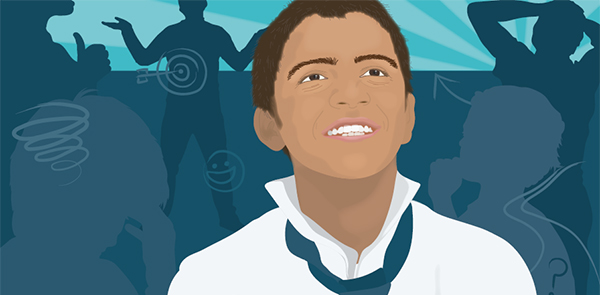Working in the space of mental health and well-being myself, I was very interested to read this piece from the Career Development Association of Australia on Mental Health. The importance of well-being does not only relate to our youth but to all of us. Having balance in our lives and maintaining an overall holistic attitude to well-being is essential for all and an integral part of how I work with my clients. Please note the following and if you want to know more please contact me for a free 10 minute intro into how I deliver my service
myfuture: How Emotions Influence Motivation and Behaviour in Career Development Learning
23/08/2023
This article was authored by Dr Michael Healy, National Career Education Manager at myfuture. See the Insights paper in its entirety, including references, here.

As they prepare to transition into employment, university, or vocational training, young people are looking towards what may be uncertain, unstable futures, while also dealing with present personal, social and financial stressors. Students will experience all manner of emotions as they navigate their career development.
Research shows that emotions influence students’ cognitive performance, motivation, goals and proactive behaviour, as well as their wellbeing. Although positive emotions can enhance motivation, attention and creative thinking, they may also impede learning by limiting the effort or attention applied to a challenging task. Similarly, while negative emotions may disrupt focus, effort and creative thinking, they can also motivate a student to reassess their strategies and redouble their efforts.
Three dimensions of emotions in career development
To help understand various emotions and their impact on student learning, Reinhardt Pekrun and his colleagues offer a three-dimensional framework, mapping emotions according to their valence, arousal and object focus.
- Valence distinguishes positive, pleasant emotions from negative, unpleasant ones.
- Arousal distinguishes emotions that activate responses and promote action from those that deactivate responses and inhibit action.
- Object focus distinguishes:
- emotions about past experiences from those about future experiences, and
- emotions evoked by feelings about the action itself from those evoked by the outcomes of those actions.
Positive emotions about the past can activate positive behaviours, such as seeking opportunities to perform similar tasks, developing more advanced skills, or setting goals to achieve similar or greater outcomes they believe to be a suitable career choice. But deactivating positive retrospective emotions can also inhibit motivation and proactive behaviours. Contentment might mean that someone feels no need to pursue further experiences or achievements, despite enjoying and succeeding at an activity. Enjoying and being good at something doesn’t necessarily mean that someone has a true desire to pursue a related career.
Negative emotions about the past relate to a dislike of past activities or feelings of failure about their outcomes. The behavioural consequences of negative retrospective emotions will vary. Some will reflect on their experience and resolve to do better next time, while others might ruminate on their negative experience or get angry about real or perceived unfairness.
Positive emotions about the future can activate positive behaviours such as a greater application of effort. However, they may have a deactivating effect and diminish the strength of goals and motivation, such as when assurance develops into overconfidence and less effort is applied to a task.
Negative emotions about the future may be focused on the outcome of a future activity, such as fear of being rejected in a job application, or on the activity itself, such as a general dislike of networking. Negative prospective emotions can influence a person’s ability to perform a task successfully and, if intense enough, they may avoid the activity altogether.
Working with emotions in career development practice
As career practitioners, we can consider how these emotions might support or undermine our clients’ motivation and proactive behaviours, and how we might best adapt our strategies in response.
Firstly, we should always be attentive to the impact of negative emotions on our students and be prepared to refer clients to professional mental health support when they are particularly intense. Career educators can play a vital role in helping their students cope with – and perhaps even embrace – failure. We can also look for the influence of deactivating negative emotions such as apathy and disinterest, and research ways to help clients work through them.
Career educators can also help young people harness the motivational power of positive emotions, directing it toward further proactive career behaviours. However, we should be careful not to assume that someone’s past enjoyment and success is a guarantee that a related career pathway is the best choice. We should also not assume that self-assured students do not need motivational support.
More than anything, we need to ensure that we help cultivate a safe environment for our students to reflect on, learn from and manage their career development emotions. This does not mean that we insulate students from uncertainty, pain or disappointment, all of which are valuable triggers for learning and development. Rather, it means that we recognise, value and respect our students’ emotions and support them to do the same.
myfuture draws on professional research and theory to build an evidence base that informs and supports users’ transition from study to the world of work. Backed by subject matter expertise and research, myfuture’s Insights series seeks to explore how this evidence base drives the development of the service forward.

